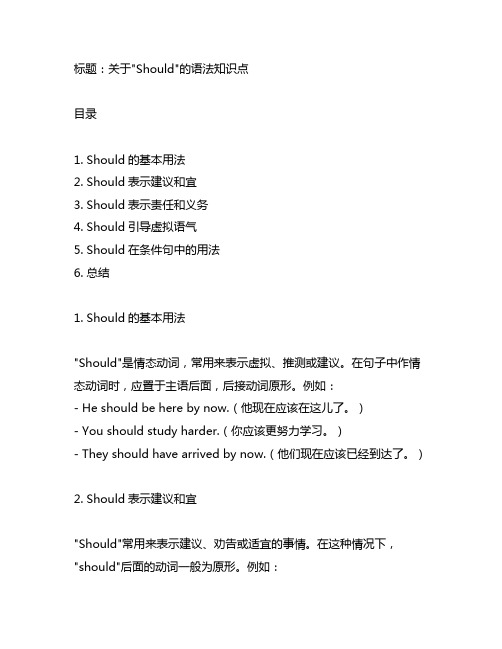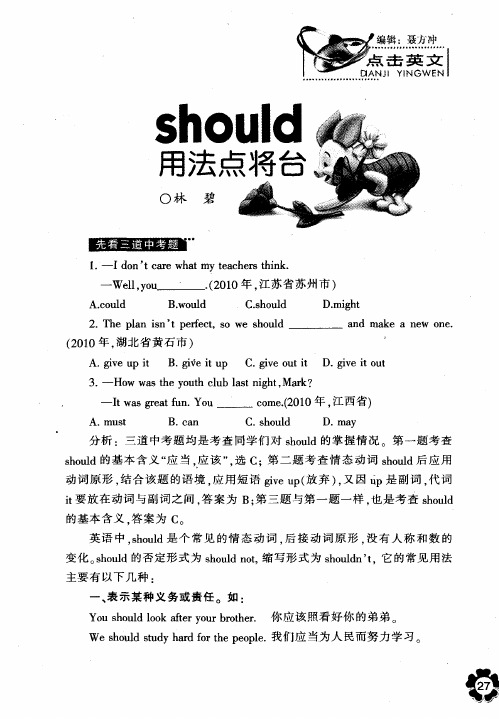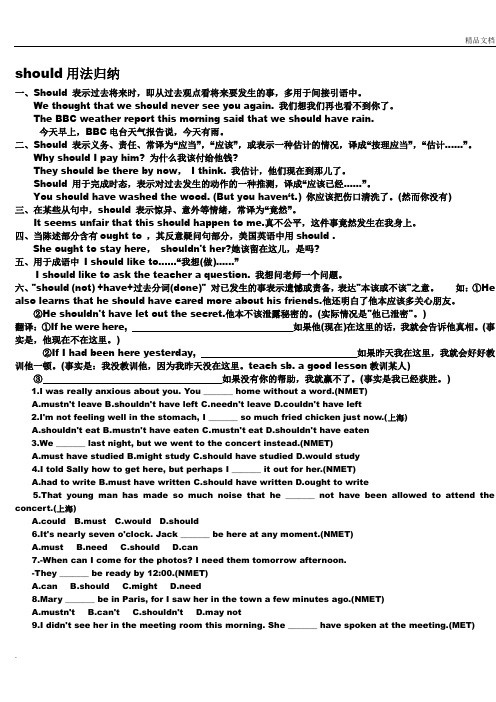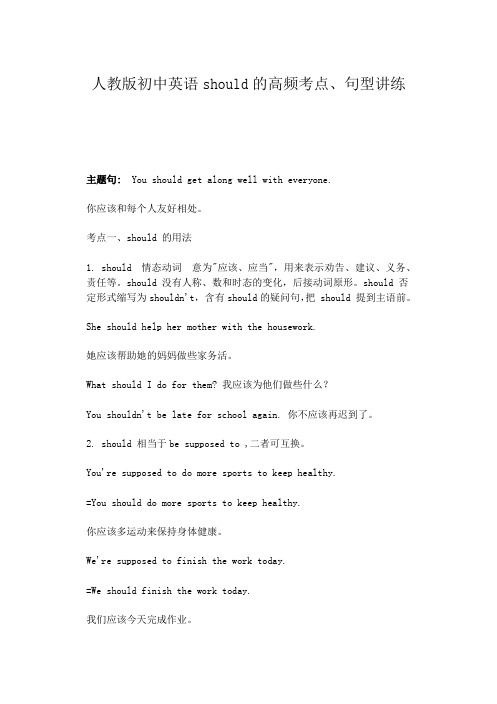should用法点将台
should的用法总结

should的用法总结Should的用法总结。
Should是一个常用的情态动词,它在英语中有着多种用法。
在本文中,我们将对should的用法进行总结,帮助大家更好地理解和运用这一情态动词。
1. 表示建议或建议。
Should常常用来表示建议或建议。
比如,我们可以说,“You should eat more vegetables.”(你应该多吃蔬菜。
)这句话就是在向对方提出建议。
另外,should也可以用在虚拟条件句中,表示假设的建议,比如,“If I were you, I should take a break.”(如果我是你,我会休息一下。
)。
2. 表示期望或推测。
Should还可以用来表示期望或推测。
比如,我们可以说,“He should be home by now.”(他现在应该已经回家了。
)这句话表示我们对某件事情的期望或推测。
另外,should也可以用在疑问句中,表示询问对方的期望或推测,比如,“Shouldn't you be studying for the exam?”(你不应该在复习考试吗?)。
3. 表示义务或责任。
Should还可以用来表示义务或责任。
比如,我们可以说,“You should apologize for what you said.”(你应该为你说的话道歉。
)这句话表示对方有道歉的义务或责任。
另外,should也可以用在虚拟条件句中,表示假设的义务或责任,比如,“If I were you, I should help her.”(如果我是你,我会帮助她。
)。
4. 表示可能性或假设。
Should还可以用来表示可能性或假设。
比如,我们可以说,“She should be at the meeting by now.”(她现在应该已经在会议上了。
)这句话表示对某件事情的可能性或假设。
另外,should也可以用在疑问句中,表示询问对方的可能性或假设,比如,“Shouldn't it be raining by now?”(现在应该下雨了吧?)。
should的用法总结归纳

should的用法总结归纳"should" 是一个情态动词,用于表示建议、义务、推测、期望等含义。
以下是 "should" 的用法总结归纳:1. 表示建议:- You should study for the exam.(你应该为考试而学习。
)- She should see a doctor about her persistent cough.(她应该去看医生治疗她持续的咳嗽。
)2. 表示义务或责任:- Employees should arrive on time for work.(员工应该准时上班。
)- Citizens should pay their taxes on time.(公民应该按时缴纳税款。
)3. 表示期望或要求:- Students should respect their teachers.(学生应该尊重他们的老师。
)- Customers should provide accurate information when placing an order.(顾客在下订单时应该提供准确的信息。
)4. 表示推测或假设:- It should be sunny tomorrow.(明天应该是晴天。
)- She should be at the meeting by now.(她现在应该已经在会议上了。
)5. 在虚拟条件句中使用:- If I were you, I should apologize.(如果我是你,我应该道歉。
)1/ 2- He should have called, but he didn't.(他本应该打电话来的,但他没有。
)需要注意的是,"should" 是一种非常正式的用法,较为客观和礼貌。
在口语中,可以使用 "should" 的替代词如 "ought to" 或"need to"。
should用法总结汇总

千里之行,始于足下。
should用法总结汇总Should是一个情态动词,用于表示建议、意愿、命令、推想等。
它有多种用法和结构,下面将对should的用法进行总结。
1. 表示建议:a. 主语+should+动词原形:用于表示一般性的建议或意愿。
- You should exercise regularly to stay healthy.(你应当经常熬炼以保持健康。
)- We should leave early to avoid traffic.(我们应当提前离开,以避开交通拥堵。
)b. 主语+would/should+动词原形:用于表示有礼貌或客气的建议。
- Would you should drop me off at the station?(你可以把我送到车站吗?)- Should I help you with your luggage?(我来帮你拎行李吗?)c. It is (high) time that+主语+should+动词原形:用于表示“早该……了”。
- It is high time that we should take action to protect the environment.(我们早该实行行动爱护环境了。
)- It is time that you should start looking for a job.(你早该开头找工作了。
)2. 表示命令或要求:主语+should+动词原形:用于表示命令、要求或建议具有强制性的状况。
- You should stop talking in class.(你应当停止在课堂上讲话。
) - They should pay the bill before leaving the restaurant.(他们离开餐厅之前应当先付款。
)第1页/共2页锲而不舍,金石可镂。
3. 表示推想、假设、猜想:a. 主语+should+动词原形:用于表示对某种可能性或预期结果的猜想。
should用法中考

should用法中考should是情态动词,它的基本用法是必须和其他动词一起构成谓语。
should后面一定一定要加动词原形。
情态动词没有人称和数的变化。
一,意为"应该....应当.."。
should(应当,应该)用于所有人称,表示劝告或建议。
eg. You should wait a little more.你应该再多等一会儿。
I have a very bad cold.我感冒很厉害。
You should lie down and have a rest.你应该躺下,多喝水。
二should表示预期,意料之内。
例:The train starts at 6 in the morning, and we should arrive there before noon.三作shall的过去式使用在使用情态动词shall的句中,如果出现在含有过去时间的谓语后面的宾语从句中,一般将来时的shall就应该变成过去将来时的should。
例句:He said he should get the money back, whatever the cost!他说他一定要把钱弄回来,不管付出多少代价。
四表推测It should be a nice day tomorrow.明天应该是个好天气。
He should be home by now.他现在应该在家。
should没有人称和数的变化,其后跟动词原形。
如:You should see a doctor at once.She should take more exercise.We / They should drink milk every day.should的否定式是在should后面加not,可以缩写为shouldn’t,意为“不应当;不应该”。
如:You should not / shouldn’t work on the computer all day.含有should的一般疑问句是将should提至主语前;其简略回答分别为“Yes,主语(人称代词)+should.”和“No,主语(人称代词)+shouldn’t.”。
should的用法总结

should的用法总结一、表示建议或提议1. 表示主张、建议、劝告:You should see a doctor if you have a fever. 如果你发烧了就应该看医生。
You should visit the Great Wall if you travel to Beijing. 如果你去北京旅游,应该去参观长城。
2. 表示反驳或提出异议:I don't think you should go out in such bad weather. 我认为天气如此恶劣,你不应该出门。
3. 表示意愿或决心:I should work harder to get a better grade. 我应该更加努力学习以获得更好的成绩。
二、表示命令或强制1. 表示命令或要求:You should apologize to her before it's too late. 你应该在来得及之前向她道歉。
2. 表示责任或义务:You should pay your rent on time. 你应该按时支付租金。
三、表示推测或猜测1. 表示推测、可能性或假设:She should be sleeping now. 她可能现在正在睡觉。
He shouldn't have any trouble passing the exam. 他应该没有通过考试的问题。
2. 表示反问:Shouldn't you be studying for your exam instead of watching TV? 你不该在看电视,应该去备考。
四、表示虚拟语气1. 表示虚拟条件句:If I had more time, I should (would) read more books. 如果我有更多时间,我应该或将会读更多的书。
2. 表示虚拟假设:If I were you, I should (would) take this job. 如果我是你,我应该或将会接受这份工作。
should的详细用法总结

千里之行,始于足下。
should的具体用法总结should是一个多功能的词,可以用作情态动词,也可以用作主动词。
作为情态动词,should often表示一种建议、劝告或期望。
在这种状况下,它通常用于if条件子句中或用于句子的主语之后。
1. 表示建议或劝告:- You should take a break and relax.(你应当休息一下,放松一下。
)- She should study more if she wants to pass the exam.(假如她想通过考试,她就应当多学习。
)2. 表示期望或意愿:- They should arrive on time.(他们应当准时到达。
)- He should call me tomorrow.(他应当明天给我打电话。
)3. 表示推想或假设:- She should be at home now.(她现在应当在家。
)- It should be sunny tomorrow.(明天应当是晴天。
)作为主动词,should在句子中表示某种义务、责任或必要性。
在这种状况下,should经常与动词原形连用。
1. 表示义务或责任:- You should help your parents with the housework.(你应当挂念父母做家务。
)- We should take care of the environment.(我们应当爱护环境。
)第1页/共2页锲而不舍,金石可镂。
2. 表示必要性或必定性:- We should eat healthy food for a better lifestyle.(我们应当健康饮食,以获得更好的生活方式。
)- You should pay attention to your grammar when writing.(写作时应留意语法。
)除了上述用法外,should还有其他一些常见的搭配:1. Should have + 过去分词:表示对过去某个行动的建议、绝望或懊悔。
关于should的语法知识点

标题:关于"Should"的语法知识点目录1. Should的基本用法2. Should表示建议和宜3. Should表示责任和义务4. Should引导虚拟语气5. Should在条件句中的用法6. 总结1. Should的基本用法"Should"是情态动词,常用来表示虚拟、推测或建议。
在句子中作情态动词时,应置于主语后面,后接动词原形。
例如:- He should be here by now.(他现在应该在这儿了。
)- You should study harder.(你应该更努力学习。
)- They should have arrived by now.(他们现在应该已经到达了。
)2. Should表示建议和宜"Should"常用来表示建议、劝告或适宜的事情。
在这种情况下,"should"后面的动词一般为原形。
例如:- You should take a break.(你应该休息一下。
)- We should start early.(我们应该早点开始。
)- She should see a doctor.(她应该去看医生。
)3. Should表示责任和义务"Should"也可以表示责任和义务,通常用于表示某种道德上的义务或应尽的责任。
例如:- You should apologize for your mistake.(你应该为自己的错误道歉。
)- We should help those in need.(我们应该帮助有需要的人。
)- She should have returned the money.(她本应该把钱退还。
)4. Should引导虚拟语气在虚拟语气中,"should"常用来表示主观的推测或建议。
在这种情况下,"should"后面的动词一般为原形。
知识点——should的用法大全

已经……”,“本来应该……”,即过去该做某
事但实际没有做。
should的用法大全
【典型例题】
2. Jean ___________have kept his promise. I wonder why he changed his idea. A. must B. should C. need D. would 答案:B 解析:“should have +过去分词” 表示“过去本 来应该(但没能)做某事”;keep one’s promise 意为 “信守诺言”。
should的用法大全
【知识点解析】
三、 should 作为情态动词,可以用在条件状语从句中, 表示语气较强的假设,译作“万一”、“竟然”,这 时也可将 should 置于从句之首,即将 should 放在主语 前面,而省略从属连词 if。例如: If you should fail to com = Should you fail to come, ask Mrs. Chen to work in your place. 万一你来不了,就叫陈夫人代替你。
should的用法大全
【知识点解析】
2. 用在 suggest (propose), arrange, plan, decide,, advise, order, demand, request, desire, insist 等表示“建议”、“要求”、 “命令”、“决定”、“安排”、“计划”、“主张”的 动词后面接的宾语从句中。这里的 should 也可以省略。 3. 用在“It is desired/ suggested/ requested/ ordered/ proposed/ decided ”之后由 that 引导的主语从句中,should 也可以省略。例如: 4. 用在 suggestion, motion, proposal, order, plan, idea, advice, request, decision, require 等名词后面接的表语从句或同位 语从句中,should 也可以省略。
should用法归纳

should用法归纳“should”在英语中是一个非常有用的情态动词,它可以表示义务、责任、劝告、建议等含义。
以下是对其用法的一些归纳:1. 表示义务或责任:在这种语境下,“should”可以用于表示某种行为是出于法律、道德或伦理的要求,有义务或责任去完成。
例如:“You should respect the rights of others.”(你应该尊重他人的权利。
)2. 表示劝告或建议:当“should”用于提出建议或劝告时,它通常基于个人的判断或经验,认为某件事情是可取的或更好的。
例如:“In my opinion, you should choose this option.”(我认为,你应该选择这个选项。
)3. 表示推测或期望:在某些情况下,“should”可以用于表示对未来事件的期望或推测,尤其是在表达个人观点时。
例如:“They should win the game.”(他们应该会赢得比赛。
)4. 用于虚拟语气:“should”也可以用于构成虚拟语气,表达与现实相反的情况或假设条件。
例如:“If I should be elected, I would serve my constituents well.”(如果我当选,我会为我的选民服务得很好。
)5. 表示谦逊或礼貌:在某些情况下,“should”可以用于表示谦虚或礼貌,例如:“I should like to thank you for your help.”(我想感谢你的帮助。
)总的来说,“should”是一个非常灵活的词语,其用法取决于具体的语境和说话者的意图。
正确地使用“should”可以帮助我们更准确地表达自己的想法,同时也能更好地理解别人的意思。
should用法点将台

变化 。 hud的否定 形 式 为 s o l o, 写 形 式 为 so ln’。它 的 常 见用 法 so l h ud n t缩 h ud t 主要 有 以下 几 种 :
上 课迟 到 了 . 本 应 该 向 老 师说 一 声 对 不 起 ( 你 可是 却 没 有 ) 。
Yo h ud ’ h v l n o ea o thssce ew e S 于 我 们 之 us o ln t aet d a y n b u i ert t en U .关 o t b
A. s mu t
B. a cn
分 析 :三 道 中考 题 均 是 考 查 同 学们 对 so l 掌 握情 况 第 一 题 考 查 h ud的 s0l h ud的基 本 含 义 “ 当 , 该 ” 选 C:第 二 题 考查 情 态 动 词 s o l 应 用 应 应 。 h ud后 动词 原 形 , 合 该 题 的 语 境 , 用 短 语 gv p 放 弃 ) 又 因 是 副 词 , 词 结 应 ieu ( , 代 i要 放在 动 词 与 副 词 之 间 , 案 为 B: 三 题 与 第 一 题 一 样 . t 答 第 也是 考查 so l h ud 的基 本 含 义 . 案 为 C。 答
一
、
表 示 某种 义 务 或 责 任 。如 :
Y usol l k f r or r hr 你 应该 照看 好 你 的弟 弟 o ud o t u o e. h o ae y b t Wesol uyhr r h ep . 们应 当为 人 民而努 力 学 习 。 u s d a f e ol 我 h dt dot p e
should的用法总结

should的用法总结should表示应该,掌握should的用法对英语学习是很有必要的,下面小编给大家整理了should的用法总结,希望大家喜欢!should的释义(常用于纠正别人) 应该,应当; (提出或征询建议) 该,可以; (表示预期) 应该会,可能;should的用法■表示“应该,应当”He should work harder. 他应该更加努力。
You should help your mother with the housework. 你应该帮你母亲做家务。
Crime should be punished. 犯罪应受惩罚。
Should I wear a coat?我要穿大衣吗?■表示“可能,该(=will probably) ”He should arrive soon他可能很快就到了。
The train should have already left. 火车大概已经走了。
■表示“万一”If it should rain tomorrow, don’t expect me. 万一明天下雨,就不要等我了。
■表示“竟然”It’s strange that he should be late. 真奇怪,他竟会迟到。
■表示粗暴地拒绝一项建议、要求或指示—What time does the film start? 电影什么时候开始?—How should I know? 我怎么知道?—Ann’s very unhappy. 安非常不高兴。
—Why should I care? 这管我什么事?—Could your wife help us in the office tomorrow? 你妻子明天能到办公室来帮帮我们吗?—Why should she? She doesn’t work for you. 她为什么就该去? 她又不是为你们工作的。
■should加完成式:should have done表示“本应该做某事,但事实上却没有做”;shouldn’t have done表示“本不该做某事,但事实上却做了”。
should的用法和例句

should的用法和例句
should的用法和例句如下:
1、情态动词:should表示“应该,应当”,常用来征求别人的意见和建议。
后接动词原形,没有人称和数的变化。
肯定句句型:主语+should+动词原形+其他成分。
例句:You should stop talking.你应该戒烟。
2、命令或者要求:should表示命令或者要求。
否定句句型:主语+should+not+动词原形+其他成分。
例句:You shouldn't talk in class.你不许在课堂上讲话。
3、预测或者可能:should表示预测或者可能。
例句:His schoolbag should be in the classroom.他的书包应该在教室里面。
4、失望、愤怒和惊讶:should有时表示说话人的失望、愤怒和惊讶。
例句:Why should I go?为什么是我去?。
should用法总结

疑问句中使用方法
一般疑问句
在一般疑问句中,should通常放在句首 ,用于询问对方的建议或看法。例如: “Should we go out for dinner tonight?”(我们今晚应该出去吃饭吗? )
VS
特殊疑问句
在特殊疑问句中,should可以与其他疑 问词一起使用,用于询问更具体的信息。 例如:“Why should we hire him for the job?”(为什么我们应该雇他来做这 份工作?)
表达责任或义务时运用
强调责任
should可以用来强调某人的责任或义务,例如“You should apologize for what you did.”(你应该为你 所做的事情道歉。)
表示必要性
在表达某种必要性时,should可以表示一种强制性的 要求或命令,例如“You should wear a helmet when you ride a bike.”(骑自行车时你应该戴头盔 。)
should用法总结
汇报人:XX
目录
• should基本概念与用法 • should在时态和语气中运用 • should与其他情态动词比较 • 常见错误及注意事项 • 实例分析:should在不同场合下运用 • 总结回顾与拓展延伸
01
should基本概念与用法
should定义及词性
定义
should是英语中的一个情态动词,用 于表达建议、义务、可能性等含义。
“You should study hard.”(你应该努力学习。)表示 一种责任,而“You can study hard.”(你可以努力学习 。)表示一种能力或可能性。
要点二
should的语气比can/could更为 强烈。例如
should用法归纳与练习

should用法归纳一、Should 表示过去将来时,即从过去观点看将来要发生的事,多用于间接引语中。
We thought that we should never see you again. 我们想我们再也看不到你了。
The BBC weather report this morning said that we should have rain.今天早上,BBC电台天气报告说,今天有雨。
二、Should 表示义务、责任、常译为“应当”,“应该”,或表示一种估计的情况,译成“按理应当”,“估计......”。
Why should I pay him? 为什么我该付给他钱?They should be there by now,I think. 我估计,他们现在到那儿了。
Should 用于完成时态,表示对过去发生的动作的一种推测,译成“应该已经......”。
You should have washed the wood. (But you haven‘t.) 你应该把伤口清洗了。
(然而你没有)三、在某些从句中,should 表示惊异、意外等情绪,常译为“竟然”。
It seems unfair that this should happen to me.真不公平,这件事竟然发生在我身上。
四、当陈述部分含有ought to ,其反意疑问句部分,美国英语中用should .She ought to stay here,shouldn't her?她该留在这儿,是吗?五、用于成语中I should like to......“我想(做)......”I should like to ask the teacher a question. 我想问老师一个问题。
六、"should (not) +have+过去分词(done)" 对已发生的事表示遗憾或责备,表达"本该或不该"之意。
初二英语语法should的用法知识点

⽆忧考为⼤家整理的初⼆英语语法should的⽤法知识点的⽂章,供⼤家学习参考!更多最新信息请点击(⼆)should的⽤法:should⽤来提出建议和忠告,后边加动词原形,否定句直接在should后边加not.例如:I think you should eat less junk food.我认为你应该少吃垃圾⾷品。
She drives a lot and she seldom walks. So I think she should walk a lot.她经常开车,很少⾛路。
所以我认为她应该多⾛路。
Students shouldn’t spend too much time playing computer games.学⽣们不应当花太多的时间玩计算机游戏。
学习向别⼈提建议的⼏种句式:(1)I think you should…(2)Well, you could…(3)Maybe you should …(4)Why don’t you…?(5)What about doing sth.?(6)You’d better do sth.★★练⼀练★★⽤should或shouldn’t填空1. I can’t sleep the night before exams.You ______ take a warm shower before you go to bed.2. Good friends ______ argue each other.3. There is little milk in the glass. We _______ buy some.4. They didn’t invite you? Maybe you ______ be friendlier.5. I am a little bit overweight. So I think I _______ do exercises every day.答案:1. should 2. shouldn’t 3. should 4. should 5. should。
人教版初中英语should 的高频考点、句型讲练

人教版初中英语should的高频考点、句型讲练主题句:You should get along well with everyone.你应该和每个人友好相处。
考点一、should 的用法1. should 情态动词意为"应该、应当",用来表示劝告、建议、义务、责任等。
should 没有人称、数和时态的变化,后接动词原形。
should 否定形式缩写为shouldn't,含有should的疑问句,把 should 提到主语前。
She should help her mother with the housework.她应该帮助她的妈妈做些家务活。
What should I do for them? 我应该为他们做些什么?You shouldn't be late for school again. 你不应该再迟到了。
2. should 相当于be supposed to ,二者可互换。
You're supposed to do more sports to keep healthy.=You should do more sports to keep healthy.你应该多运动来保持身体健康。
We're supposed to finish the work today.=We should finish the work today.我们应该今天完成作业。
考点二、短语get along with 的用法1. get along with 意为"进行,进展"How are you getting along with your English? 你的英语学得怎样?He is getting along well with his work. 他的工作进展顺利。
2. get along (well) with= get on (well) with 意为"与某人相处(融洽)".How are you getting along / on with your classmates?你和你的同学们相处得怎样?It's important to get along well with friends.和朋友友好相处是在非常重要的。
初二英语语法情态动词should用法讲解

初二英语语法情态动词should用法讲解
初二英语语法情态动词should用法讲解
情态动词should"应该"学会使用
should作为情态动词用,常常表示意外、惊奇、不能理解等,有"竟会"的意思,例如:
HowshouldIknow?我怎么知道?
Whyshouldyoubesolatetoday?你今天为什么来得这么晚?
should有时表示应当做或发生的事,例如:
Weshouldhelpeachother.我们应当互相帮助。
我们在使用时要注意以下几点:
1.用于表示"应该"或"不应该"的概念。
此时常指长辈教导或责备晚辈。
例如:
Youshouldbeherewithcleanhands.你应该把手洗干净了再来。
2.用于提出意见劝导别人。
例如:
Youshouldgotothedoctorifyoufeelill.
如果你感觉不舒服,你最好去看医生。
3.用于表示可能性。
should的`这一用法是考试中常常出现的考点之一。
例如:
Weshouldarrivebysuppertime.我们在晚饭前就能到了。
Sheshouldbehereanymoment.她随时都可能来。
should用法归纳

should用法归纳Should 用法归纳Should 是一个常见的情态动词,用来表示义务、建议、推测以及对过去发生的事情的猜测。
在本文中,我们将归纳总结 should 的多个用法及示例,以帮助读者更好地理解和运用这一语法结构。
1. 表示义务或责任Should 可以用来表示某种期望、义务或责任。
在这种用法中,should 往往用于第二或第三人称,与动词原形连用。
例如:- You should finish your homework before going out to play. (你应该在外出游玩之前完成作业。
)- We should respect our elders. (我们应该尊敬长辈。
)- Parents should take care of their children's well-being. (父母应该关注孩子的幸福。
)2. 表示建议或劝告Should 也可以用来给出建议或劝告,提示某人采取特定的行动或避免某种行为。
这种用法常出现在虚拟语气的句子中。
例如:- You should see a doctor if you have a persistent cough. (如果你持续咳嗽,你应该去看医生。
)- I think you should apologize for what you said. (我认为你应该为你所说的道歉。
)- If you want to improve your English, you should practice speaking every day. (如果你想提高你的英语,你应该每天练习说话。
)3. 表示推测或可能性Should 还可以用来表示推测或可能性,表达某种程度上的猜测或判断。
在这种用法中,should 后面通常跟上动词原形。
例如:- He should be at home by now. (他现在应该在家了。
)- It's already 9 o'clock. She should have arrived by now. (已经九点了,她现在应该到达了。
- 1、下载文档前请自行甄别文档内容的完整性,平台不提供额外的编辑、内容补充、找答案等附加服务。
- 2、"仅部分预览"的文档,不可在线预览部分如存在完整性等问题,可反馈申请退款(可完整预览的文档不适用该条件!)。
- 3、如文档侵犯您的权益,请联系客服反馈,我们会尽快为您处理(人工客服工作时间:9:00-18:30)。
should用法点将台
作者:林碧
来源:《初中生之友·中旬刊》2011年第09期
先看三道中考题
1. —I don’t care what my teachers think.
—Well,you________.(2010年,江苏省苏州市)
A.could B.would C.should D.might
2. The plan isn’t perfect, so we should _________ and make a new one.(2010年,湖北省黄石市)
A. give up it
B. give it up
C. give out it
D. give it out
3. —How was the youth club last night,Mark?
—It was great fun. You ______ come.(2010年,江西省)
A. must
B. can
C. should
D. may
分析:三道中考题均是考查同学们对should的掌握情况。
第一题考查should的基本含义“应当,应该”,选C;第二题考查情态动词should后应用动词原形,结合该题的语境,应用短语give up(放弃),又因up是副词,代词it要放在动词与副词之间,答案为 B;第三题与第一题一样,也是考查should的基本含义,答案为 C。
英语中,should是个常见的情态动词,后接动词原形,没有人称和数的变化。
should的否定形式为should not, 缩写形式为shouldn’t,它的常见用法主要有以下几种:
一、表示某种义务或责任。
如:
You should look after your brother. 你应该照看好你的弟弟。
We should study hard for the people. 我们应当为人民而努力学习。
You should be on duty today. 今天你应当值日。
二、表示建议、要求、命令或劝告。
如:
You should listen to the teacher carefully in class. 在课堂上你应该认真听老师讲课。
You shouldn’t smoke so much,I think. 我认为你不应该抽这么多烟。
You should listen to the doctor’s advice. 你应该听医生的劝告。
三、表示“可能性、期望”以及“推测即将发生的情况”。
如:
He should arrive at noon. 他应该中午到达。
Your English grammar book should be in the reading-room. 你的英语语法书可能在阅览室。
It’s nearly seven o’clock. Jack should be here at any moment. 现在快七点了,杰克随时会在这儿的。
四、表示意外、惊讶、难以理解等感情色彩,此时多用于由疑问词how或why引导的特殊疑问句中。
如:
How should I know the result?我怎么会知道结果?
Why should I go?我干吗要去?
Why should you be so late today?今天你为什么来得这么晚?
友情提示
should have done表示“某事本应该发生却未发生”;shouldn’t have done表示“不应该发生的事却发生了”。
这两种情况都含有批评、责备意味。
如:
You are late for class. You should have said “I’m sorry” to the teacher.
上课迟到了,你本应该向老师说一声对不起(可是却没有)。
You shouldn’t have told anyone about this secret between us.关于我们之间的秘密,你不应该告诉任何人(可是却告诉了)。
牛刀小试
I. 选择填空。
1. Schools _________ allow(允许,准许) students at least one hour a day for sports.
A. would
B. might
C. should
D. could
2. We ___________ keep the traffic law and learn how to protect (保护) ourselves.
A. may
B. should
C. can
D. need
3. The young man ________ be polite to the old.
A. should
B. may
C. have to
D. can
4. We have so many things to do with you. You ______ go to bed so early.
A. don’t should
B. not should
C. aren’t should
D. shouldn’t
5. Excuse me, can you tell me ________ next?
A. how to do
B. what we should do
C. what should we do
D. how we should do
II. 将下列句子译成英语,每空一词。
1. 或许你应该向他道歉。
Maybe you _______ ______ ________ _______ him.
2. 你不应该太粗心。
You ________ _______ too careless.
3. 李老师应该在办公室。
我刚才看见他了。
Mr Li ______ _______ ______ the office now. I saw him just now.
4. 我们应该为他们做些什么呢?
What ______ we ______ for them?
5. 你应该回家吃晚饭了。
You _______ _______ home for dinner.
I. 1~5 C B A D B
II. 1. should say sorry to 2. shouldn’t be 3. should be in 4. should;do 5. should go。
